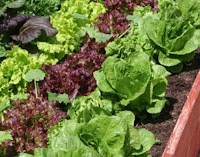There are lots of reasons to buy organic.
First, it's better for the environment. No pesticides means healthier soil, water, and wildlife. Buying organic supports small farmers. Organic farmers can earn a fairer price for organic produce compared to factory farming. Organic farming is good for biodiversity. Organic farmers are growing a wide variety of non-genetically modified (non-GMO) fruits and vegetables. Where factory farming has shrinked our choices in the supermarket to one or two types of any produce variety, organic farmers are resurrecting many heirloom varieties.
Finally, organic foods are healthier for you. The research on whether consuming organic food is healthier for people remains inconclusive. However, the USDA's own tests show that most non-organic produce contain residual pesticides even after washing. The long term effects of consuming these pesticides has not been sufficiently studied, but they can't be good for you.
Celery has no protective skin, which makes it almost impossible to wash off the chemicals that are used on conventional crops.
Multiple pesticides are regularly applied to these delicately skinned fruits in conventional orchards.
If you buy strawberries out of season, they're most likely imported from countries that use less-stringent regulations for pesticide use.
Like peaches, apples are typically grown with the use of poisons to kill a variety of pests, from fungi to insects. Scrubbing and peeling doesn't eliminate chemical residue completely, so it's best to buy organic when it comes to apples. Peeling a fruit or vegetable also strips away many of their beneficial nutrients.
BlueberriesBlueberries are treated with as many as 52 pesticides, making them one of the dirtiest berries on the market.
With 33 different types of pesticides found on nectarines, they rank up there with apples and peaches among the dirtiest tree fruit.
Peppers have thin skins that don't offer much of a barrier to pesticides. They're often heavily sprayed with insecticides.
New on the list for 2010, spinach can be laced with as many as 48 different pesticides, making it one of the most contaminated green leafy vegetable.
Traditionally kale is known as a hardier vegetable that rarely suffers from pests and disease, but recently it was found to have high amounts of pesticide residue.
Even locally grown cherries are not necessarily safe. In fact, in one survey in recent years, cherries grown in the U.S. were found to have three times more pesticide residue then imported cherries.
America's favorite vegetable can be laced with as many as 37 different pesticides.
Vineyards can be sprayed with different pesticides during different growth periods of the grape, and no amount of washing or peeling will eliminate contamination because of the grape's thin skin.
Leafy greens are frequently contaminated with what are considered the most potent pesticides used on food 51 of them.
Carrots can be treated with 26 different pesticides.
As insects become more resilient to the pesticides used on pears, more and more chemicals are used 28 of them.
The thin skin of tomatoes can allow pesticides to enter the fruit.


















No comments:
Post a Comment